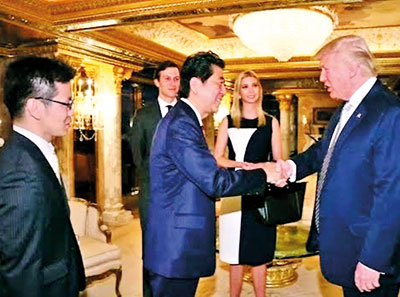Sunday Times 2
How Donald Trump’s foreign policy power will be far from unchecked
 In the wake of Donald Trump’s surprise election, Australians have engaged in public soul-searching about their alliance with the United States. Prime Minister Malcolm Turnbull has offered reassurance that strong bilateral ties will endure, while his predecessor Paul Keating urged his country to “cut the tag” with America and pursue an independent foreign policy. And prominent security scholar Hugh White observed that, “the issue for Australia today isn’t whether we should step back from our alliance with America, but whether America is stepping back from us”.
In the wake of Donald Trump’s surprise election, Australians have engaged in public soul-searching about their alliance with the United States. Prime Minister Malcolm Turnbull has offered reassurance that strong bilateral ties will endure, while his predecessor Paul Keating urged his country to “cut the tag” with America and pursue an independent foreign policy. And prominent security scholar Hugh White observed that, “the issue for Australia today isn’t whether we should step back from our alliance with America, but whether America is stepping back from us”.
Hang on a minute. Given the President-elect’s campaign opposition to the Trans-Pacific Partnership, demand for more burden-sharing by allies and questions about America’s traditional global role, it’s natural for Australians to wonder what’s in store. Yet writing off the US alliance would represent the wrong reaction at the wrong time.
A large question mark does hover over the Trump administration’s foreign policy. That’s partially because of the shift in positions as campaigning turns to governance – already, the tough rhetoric toward allies like Japan and South Korea has softened. And Trump is only now beginning to name key members of his national security team – some, like defence secretary nominee Jim Mattis, with long ties to Australia and others, like prospective secretary of state Rex Tillerson, with a history of support for free trade.
But perhaps more important is the system of checks and balances in which American foreign policy is made. Congress plays the most important role here, and since election day, senators and representatives have found new voice on national security matters.
Senator John McCain, for instance, responding to Trump’s notion of waterboarding suspected terrorists, said, “I don’t give a damn what the President of the United States wants to do, we will not waterboard”. Senator Lindsey Graham has described congressional efforts to push back against any new “reset” of relations with Russia, and both Speaker of the House Paul Ryan and Senate Majority Leader Mitch McConnell called for an inquiry into Russian attempts to influence the presidential election. Senator Marco Rubio drew attention to Trump’s secretary of state selection, saying that he has “serious concerns about his nomination”. And those are all Republicans.
The reality is that while the president is very powerful in matters of foreign policy, he is not all-powerful. The commander-in-chief can order troops into battle, negotiate or withdraw from trade agreements and treaties, conduct diplomacy and propose increases in defence spending. But he’ll need Congress to confirm his nominees for senior positions, approve any new trade agreements or treaties, spend money on the military or anything else, and refrain from passing legislation that will constrain his choices.
A supporting cast
Then there are the other actors involved in the making of national security policy – interest groups, popular opinion, think tanks and intellectuals and, on some key issues, the courts. They play important roles not only in providing ideas and shaping outcomes, but also in providing support for some presidential initiatives and raising the political price for pursuing others. Many of these actors, including those who opposed Trump as a candidate, will rightly wish him to succeed as President. But they will implement that charge by supporting some administration ideas, pushing back against others and offering alternatives throughout.
Consider a few past examples. President Jimmy Carter pledged to withdraw US troops from South Korea. After pushback from the military, American diplomats and Congress, he changed position. Congress overrode Ronald Reagan’s veto of sanctions on apartheid South Africa and restricted Bill Clinton’s deployment to Somalia. During the George W. Bush years, the Supreme Court overruled the administration by finding that the Geneva conventions apply to all those captured in the war on terror. During the Obama administration, Congress passed Iran sanctions over the President’s objections.
The President and his team have the greatest influence over America’s foreign policy. As we’ve seen, a phone call or even a 140 character tweet from the President-elect can change the tenor of our international relationships. And as hard as it is to stop a president from embarking on a course to which he is committed, it is harder still to compel him to act in an area he opposes, like reviving the Trans-Pacific Partnership.
But there are multiple centres of power and influence and it is the interaction among them that produces the spectrum of foreign policy.
This has implications for Australians. The US system is remarkably open, with multiple points of input. There is a reason why there are more think tanks in Washington than any other place on earth. Debate is a group affair and allies like Australia will continue to play a key role.
There may be more continuity in US policy than looks likely at the moment. The military, career diplomats, intelligence officials and leading senators and representatives aren’t going anywhere. They will provide ballast as the Trump administration gets under way and Australians should continue to work with them all.
(The writer is the president of the Centre for a New American Security in Washington, DC, and was the inaugural Alliance 21 Fellow at the University of Sydney’s US Studies Centre.)

